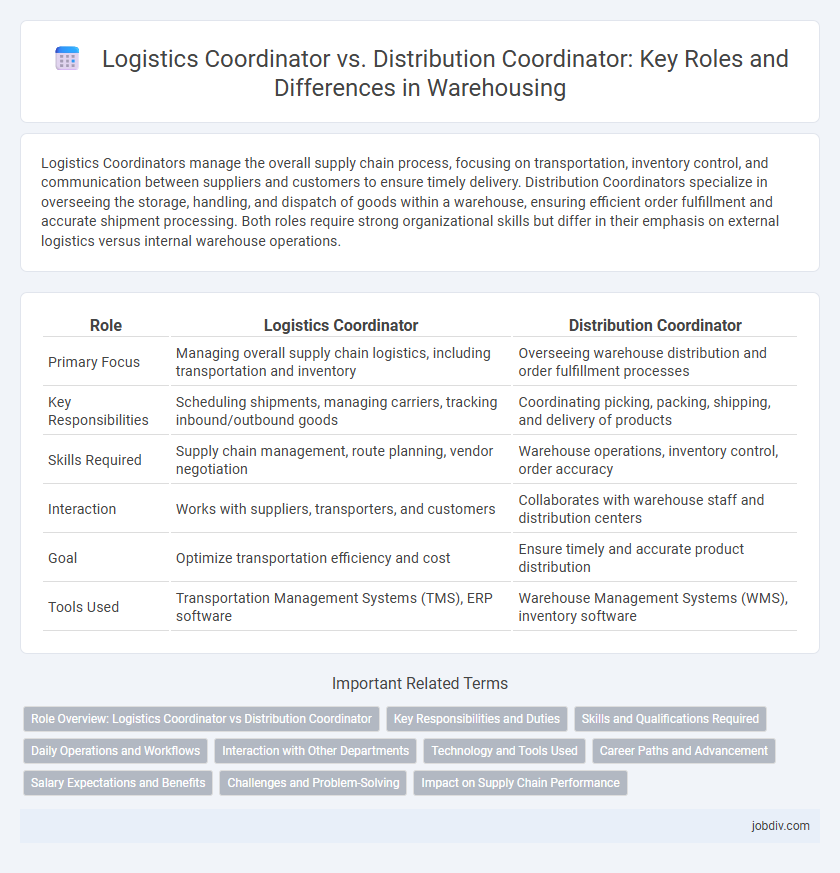Logistics Coordinators manage the overall supply chain process, focusing on transportation, inventory control, and communication between suppliers and customers to ensure timely delivery. Distribution Coordinators specialize in overseeing the storage, handling, and dispatch of goods within a warehouse, ensuring efficient order fulfillment and accurate shipment processing. Both roles require strong organizational skills but differ in their emphasis on external logistics versus internal warehouse operations.
Table of Comparison
| Role | Logistics Coordinator | Distribution Coordinator |
|---|---|---|
| Primary Focus | Managing overall supply chain logistics, including transportation and inventory | Overseeing warehouse distribution and order fulfillment processes |
| Key Responsibilities | Scheduling shipments, managing carriers, tracking inbound/outbound goods | Coordinating picking, packing, shipping, and delivery of products |
| Skills Required | Supply chain management, route planning, vendor negotiation | Warehouse operations, inventory control, order accuracy |
| Interaction | Works with suppliers, transporters, and customers | Collaborates with warehouse staff and distribution centers |
| Goal | Optimize transportation efficiency and cost | Ensure timely and accurate product distribution |
| Tools Used | Transportation Management Systems (TMS), ERP software | Warehouse Management Systems (WMS), inventory software |
Role Overview: Logistics Coordinator vs Distribution Coordinator
A Logistics Coordinator manages the planning, implementation, and coordination of the entire supply chain process, ensuring efficient transportation, inventory control, and timely delivery of goods. A Distribution Coordinator focuses on the allocation and dispatch of products within warehouses and distribution centers, optimizing order fulfillment and warehouse operations. Both roles require strong organizational skills but differ in scope, with logistics encompassing broader supply chain activities and distribution concentrating on internal warehouse management.
Key Responsibilities and Duties
Logistics Coordinators manage the planning and execution of the movement and storage of goods, ensuring timely transportation and inventory accuracy across supply chains. Distribution Coordinators focus on organizing and supervising the receipt, storage, and distribution of products within warehouses, optimizing order fulfillment and delivery schedules. Both roles require strong coordination with carriers, warehouses, and internal teams to maintain seamless operations and minimize delays in warehousing and distribution processes.
Skills and Qualifications Required
Logistics Coordinators require strong organizational skills, proficiency in inventory management systems, and the ability to coordinate transportation schedules to optimize supply chain efficiency. Distribution Coordinators need expertise in warehouse operations, knowledge of order fulfillment processes, and proficiency with distribution software to ensure accurate and timely delivery. Both roles demand excellent communication abilities, problem-solving skills, and experience with data analysis to improve workflow and reduce operational costs.
Daily Operations and Workflows
A Logistics Coordinator manages supply chain activities by overseeing the movement, storage, and delivery of products, optimizing transportation routes, and coordinating with carriers to ensure timely shipments. In contrast, a Distribution Coordinator focuses on organizing warehouse operations, including inventory control, order fulfillment, and managing distribution schedules to meet customer demand. Both roles require synchronizing daily workflows to maintain efficiency, reduce delays, and support overall supply chain performance.
Interaction with Other Departments
A Logistics Coordinator works closely with procurement, transportation, and inventory teams to streamline shipment schedules and ensure timely deliveries. A Distribution Coordinator liaises primarily with warehouse staff, retail outlets, and customer service departments to manage stock allocation and fulfill orders efficiently. Both roles require effective communication across departments to maintain a smooth supply chain operation.
Technology and Tools Used
Logistics Coordinators leverage transportation management systems (TMS) and real-time tracking software to optimize shipment routes and monitor delivery statuses, enhancing supply chain efficiency. Distribution Coordinators utilize warehouse management systems (WMS), inventory control software, and automated picking tools to ensure accurate order fulfillment and streamlined stock management. Both roles rely on enterprise resource planning (ERP) platforms to integrate data across logistics and distribution functions, improving operational visibility and decision-making.
Career Paths and Advancement
Logistics Coordinators manage the entire supply chain process, optimizing inventory flow and transportation, which provides a broad foundation for advancement into supply chain management or operations director roles. Distribution Coordinators specialize in overseeing the timely distribution of goods to various locations, honing expertise that can lead to positions such as distribution manager or warehouse operations supervisor. Career progression for both roles involves gaining leadership skills and knowledge in logistics technology, with opportunities expanding into strategic planning and global logistics coordination.
Salary Expectations and Benefits
Logistics Coordinators typically earn an average salary ranging from $45,000 to $65,000 annually, with benefits including health insurance, retirement plans, and performance bonuses. Distribution Coordinators often command slightly higher salaries, averaging between $50,000 and $70,000, due to their direct involvement in inventory management and order fulfillment, accompanied by similar benefits like paid time off and career development opportunities. Both roles may offer additional perks such as transportation allowances and flexible work schedules, influencing overall compensation packages in warehousing operations.
Challenges and Problem-Solving
Logistics Coordinators face challenges in managing supply chain disruptions and coordinating transportation schedules to minimize delays, requiring strong problem-solving skills in real-time resource allocation. Distribution Coordinators must address inventory accuracy and warehouse layout inefficiencies, implementing solutions to optimize order fulfillment and reduce errors. Both roles demand proficiency in data analysis and communication to swiftly resolve operational bottlenecks and improve overall distribution performance.
Impact on Supply Chain Performance
Logistics Coordinators optimize transportation routes and manage inventory flow, directly improving delivery speed and reducing costs within the supply chain. Distribution Coordinators focus on order fulfillment accuracy and warehouse operations, ensuring efficient handling and timely distribution of goods. Both roles critically influence supply chain performance by minimizing delays and enhancing operational efficiency.
Logistics Coordinator vs Distribution Coordinator Infographic

 jobdiv.com
jobdiv.com